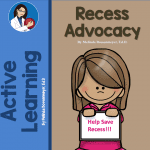Recess Advocacy

Recess Advocacy Toolkit
This toolbox contains a full PowerPoint presentation and speakers notes along with all research and documents to support daily, unstructured physical activity during school hours.
The Importance of Recess and Outdoor Play
These two handouts are part of a Handy Handouts set. The set was designed for Educators, parents and students as Informational Handouts by Super Duper Inc.

Recess in Our Schools Today: An Advocacy Toolbox
University of Central Oklahoma Graduate Student Project
Contact information – lmay0923@sbcglobal.net
Parents and educators need a resource to educate themselves as well as local school boards and legislators. This toolbox will give them the resource to gain knowledge about the issues related to the decline of recess in our schools today. In my experience, I have seen that most parents do care about their child’s school day. They are truly concerned about their child’s learning and providing their children with the best education.

Recess Is ‘In recess’ As Schools Cut Child’s Play
The timeless institution of recess is in jeopardy. A survey by the American Association for the Child’s Right to Play shows that about 40% of public schools have already cut, or are planning to cut, at least one recess period from the school day.SC Governor’s Council- Download Recess Position Statement

Tacoma Board Policy Recess
Tacoma Public Schools
Health, Nutrition and Physical Fitness Board Policy No. 6700. The board recognizes that childhood obesity has reached epidemic levels in Washington and throughout the country.
The understands the importance of recess and its positive effect upon physical, developmental, social, emotional health and well-being of children that in turn paves the way for academic excellence. In addition to required health, nutrition and fitness education, consideration should be given to a 15-minute recess in addition to the lunch recess, at a time determined by the teacher so as to best meet the instructional needs of the children.

School Recess Position Statement
STATEMENT ADOPTED BY SC GOVERNOR’S COUNCIL ON PHYSICAL FITNESS, {October 17, 2001}
All schools should offer convenient opportunities for students and staff to participate in an enjoyable physical activity, and this imperative should be embodied in policy. Recess in elementary schools is particularly important. Recess, while separate and distinct from physical education, is an essential component of the total educational experience for elementary aged children.
SC Governor’s Council- Download Recess Position Statement

What to do to Bring Back Recess
At school: Bowing to pressure from parent and civic groups, the nation’s largest beverage companies agreed last May to stop selling regular soft drinks in all public schools by 2010. What does that mean? When parents band together, they have the power to make changes. It can start with the simple step of asking your school’s PTA to lobby for healthier lunches and more physical activity for kids. In fact, the National PTA and Cartoon Network now have a “Rescuing Recess” campaign that has awarded grants to individual PTAs trying to reinstate recess as part of the regular school week.

PE and Recess Critical to Success
New York Times
Not only adults but also children need physical activity in order to stay happy, healthy, and focused. If you have children of your own, this won’t come as a surprise. However, one out of every four school-age children is being severely limited in the amount of physical activity allowed during the school day.
Recess is another cutback. Schools are rigorously restricting or completely eliminating recess altogether.

Position Statement on Recess
Recess, while separate and distinct from physical education, is an essential component of the total educational experience for elementary aged children. Recess provides children with discretionary time and opportunities to engage in physical activity that helps to develop healthy bodies and enjoyment of movement. It also allows elementary children to practice life skills such as conflict resolution, cooperation, respect for rules, taking turns, sharing, using language to communicate, and problem-solving in real situations that are real. Furthermore, it may facilitate improved attention and focus on learning in the academic program.

The Developmental and Educational Significance of Recess in Schools
In Britain and the USA, a recess (or break time) is slowly being phased out of the school day. For example, a national survey conducted in England in 1995-1996 showed that lunchtime break had been reduced, relative to 1990–1991, in 38% of the elementary schools. Further, afternoon breaks have been eliminated altogether in 27% of the elementary schools surveyed and 12% and 14%, respectively, of preschool and middle schools (see Pellegrini & Blatchford, 2000).
Proponents of recess reduction in both countries maintain that recess detracts from an already limited instructional time budget and provides opportunities for students to exhibit anti-social behavior, such as negative peer relations and aggression. However, we maintain that recess plays a positive role in children’s academic achievement and social development and, ultimately, in school adjustment. Our research has shown that breaks, or play, actually encourage academic achievement. Furthermore, youngsters learn valuable social skills by interacting with peers at break time, and these social skills help them to adjust to school.

The Effects of Recess Children with ADHD
The Department of Psychology-Andrea Ridgway
As described above, Jarrett et al. (1998) found that recess benefited all 5 participants with ADD and Ridgway et al. (2003) found that recess benefited all 3 participants with ADHD. This may not be surprising due to the fact that having difficulty focusing on classroom tasks for an extended period of time is a defining characteristic of ADD/ADHD (Jarrett et al., 1998). These studies appear to be the only two studies to specifically evaluate the effects of recess on children with ADD/ADHD. Nevertheless, recommendations abound in the literature for frequent breaks and need for active play for children with a diagnosis of ADHD.

